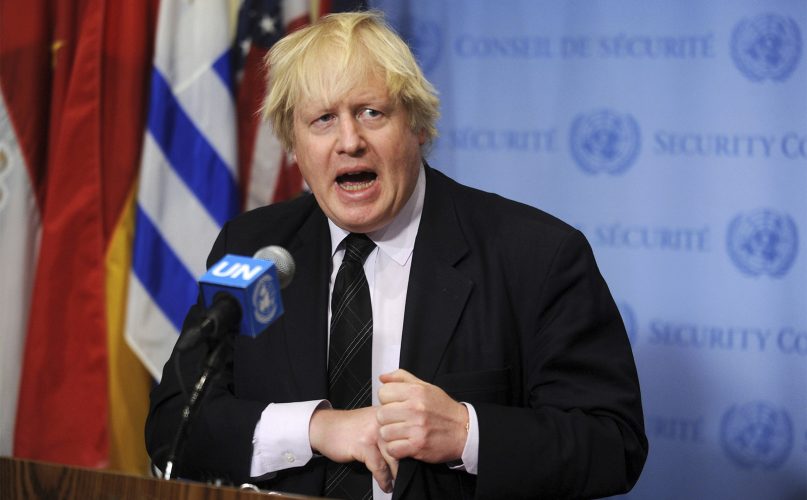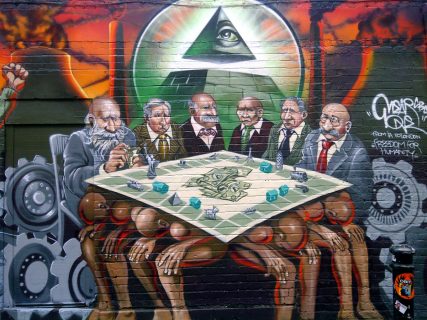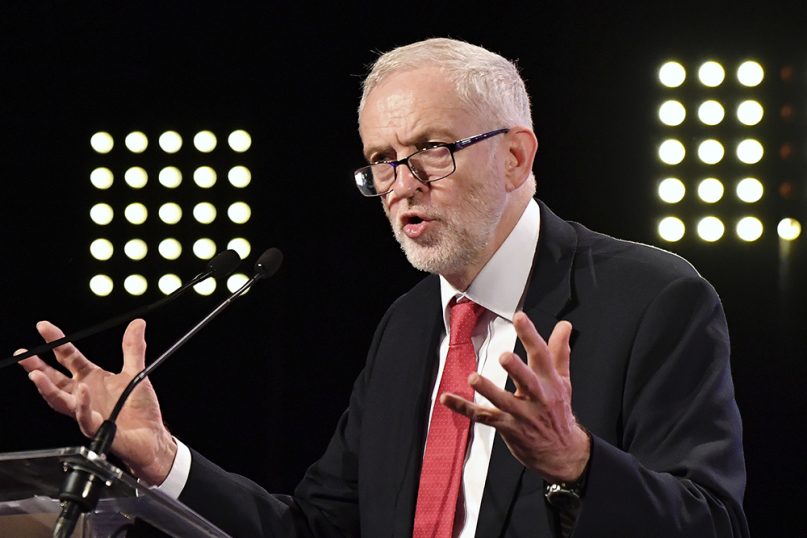LONDON (RNS) — Britain is facing an unprecedented political crisis over religious discrimination as its two biggest political parties are confronting mounting accusations over their treatment of Jews and Muslims.
The most serious allegations face the Labour Party after the U.K.’s official discrimination watchdog, the Equality and Human Rights Commission, announced this week that it is launching a formal inquiry to investigate whether the party has “Unlawfully discriminated against, harassed or victimized people because they are Jewish” and whether there has been an inadequate response from senior officials to suspected anti-Semitism.
It is only the second time the EHRC has targeted a political party; its previous investigation focused on the far-right British National Party.
The inquiry comes at a time when the Muslim Council of Great Britain has called for the governing Conservative Party to also be investigated for Islamophobia. In a letter to the EHRC, the council made a formal complaint alleging that the Conservatives have tolerated hostile remarks about Muslims.
Among the comments that it has objected to were remarks made by Boris Johnson — now a candidate to succeed Theresa May as Conservative leader and British Prime Minister — about burqas causing Muslim women to look like “letter boxes” or “bank robbers.”

Boris Johnson, former mayor of London and current secretary of state for Foreign and Commonwealth Affairs of the United Kingdom, speaks at United Nations Headquarters during a meeting of the UN Security Council in New York in 2017. (Dennis Van Tine/STAR MAX/IPx via AP)
Former party chairman Sayeeda Warsi, herself a Muslim, has also accused her party of Islamophobia and criticized it for failing to publish facts and figures about attacks on Muslims. The current chairman, Brandon Lewis, says the party has zero tolerance toward racism.
The EHRC decided to investigate Labour after receiving a series of complaints about anti-Semitism in the party’s ranks, including Jewish members of Parliament who have described receiving abuse from fellow members, as well as several reports from other groups about hostility toward Jews.
While the EHRC is not conducting a criminal investigation, a dossier of 45 cases of anti-Semitic messages posted online by Labour supporters is currently being examined by the police. The posts referred to Zionist paymasters and Jews being agents of exploitation and have used the term “zios” for Jews; the posts also included comments about executing Jews.
In the past 10 months, Labour itself has received 673 complaints of anti-Semitism, with 96 members suspended for their conduct and 12 expelled.
Concern about anti-Semitism in Labour began when Jeremy Corbyn, from Labour’s left wing, took over the party leadership in 2015. He has a formal role in British politics, known as Leader of Her Majesty’s Opposition.
Matters came to a head in 2018 when the party attempted to adopt an official statement on anti-Semitism that would not consider accusing British Jews of being more loyal to Israel an example of anti-Semitism.

A controversial mural by artist Mear One was removed in London. Photo by Bablu Miah/Creative Commons
In March of last year, Corbyn had to walk back his support, on freedom of expression grounds, for a Los Angeles-based graffiti artist, Mear One, whose mural picturing stereotypes of Jewish bankers playing Monopoly was scrubbed off a wall in London.
A few months later, a photograph emerged of Corbyn holding the wreath at a 2014 ceremony in Tunis honoring the terrorists behind the 1972 attack at the Munich Olympics, in which 11 members of the Israeli team were killed. Days afterward, Corbyn was seen in a 2013 video clip saying that a group of British Zionists had no sense of English irony. The comments were condemned by the U.K.’s former chief rabbi, Lord Sacks, as deeply offensive.
According to Rabbi Laura Janner-Klausner, Reform Judaism’s senior rabbi in Britain, there is as much concern about Corbyn’s ineffectiveness in dealing with anti-Semitism as about incidents that involve him directly.
“Corbyn and others involved in the party’s leadership have been negligent,” she said.
Janner-Klausner, a lifelong member of the Labour Party, said that there had always been a strand of anti-Semitism in the far left in Britain, which linked Jews to the evils of capitalism. But anti-Semitism, she said, had now spread to Labour, calling it a disgraceful turn of events. While others felt they had no option but to leave, she said, she would remain in the party. “We should stay and fight” she said.
Rabbi Janner-Klausner added that, though the vast majority of Britons are not anti-Semitic, there has been a rise in anti-Semitic commentary in Britain that was causing grave anxiety among Jews who make up just 0.5% of the British population.
Another of the country’s best-known rabbis, the author Julia Neuberger, said she, too, had noticed a change in Britain. “In recent years, our sense of security has been replaced by trepidation. The man who shoulders a significant proportion of the blame is Jeremy Corbyn,” said Neuberger, whose mother fled to the U.K. after most of her family was killed during the Holocaust.
Neuberger’s latest book is “Anti-Semitism: What It Is, What It Isn’t, Why It Matters.”
Many people expressed outrage this week over the speed with which Labour expelled Tony Blair’s former communications adviser, Alastair Campbell, days after he admitted voting Liberal Democrat in the recent EU elections, while it took the party three years to expel a member who claimed Jews controlled the slave trade and benefited from the Holocaust.
Meanwhile Jews for Labour, a party organization, says that people are misinterpreting valid criticism of Israel made by the party as anti-Semitism.
But Professor Alan Johnson, author of a 30,000 word “Report on Labour and anti-Semitism,” published by the online journal Fathom, warned that this claim was a red herring.
“Not a single person has been suspended or expelled from the Labour Party for making criticisms of Israel, and nor should they be. What is causing a crisis in the party is not “criticism of Israel” but hate-filled demonization and dehumanization that echoes classic anti-Semitism,” he said.
“What we are seeing is an updating of stereotyping of Jews and of conspiracy theories about them. There is a positioning among the left of the Jew as the banker. If there is any mention of Israel, it’s to see it as linked to the U.S. and being at the heart of the global capitalist system. But we are seeing a normalization of hostile attitudes and people at the top are defensive about it and unwilling to tackle it.”
Professor Johnson said that there was an unspoken issue in Labour regarding the involvement of Muslims in hostility to Jews but he said it was only part of the problem.
On Friday, the crisis in Labour deepened when a member of the party’s ruling National Executive Committee was revealed as claiming on tape that the furor over anti-Semitism in the Labour Party was created by the Israeli Embassy in London.
Peter Willsman, who had previously said “Trump fanatics” were behind the anti-Semitism accusations, was recorded as saying the embassy was “almost certainly” behind the row.
Mr. Willsman was suspended by the party, but the Jewish organization the Board of Deputies of British Jews called for his immediate expulsion. Deputy Labour leader Tom Watson said the matter highlighted “how serious the problem of anti-Semitism is in our party.”





